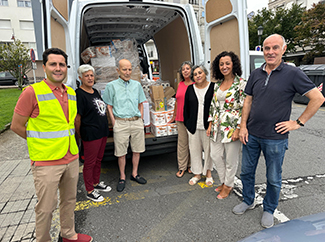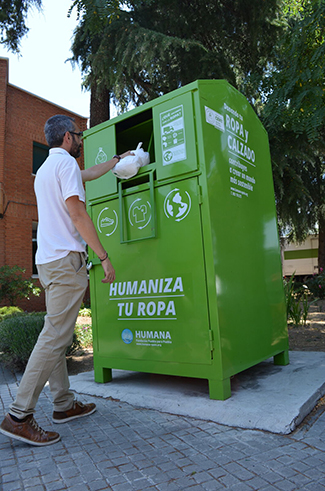consent_cookie
Duración: 1 year
Stores the user's cookie consent state
02-09-2024
Humana Fundación Pueblo para Pueblo and the Marín Council have delivered several batches of basic necessities to different social entities. They are Comedor Benéfico de Marín , Cáritas, Cáritas San Tomé, Acción Solidaria Sor Elvira and AMENAC.
Together they represent around 1,400 personal hygiene items, such as shampoos, toothpaste and toothbrushes, feminine hygiene products or toilet paper, destined for families in difficulty. The action is part of the Foundation's Local Support Program and is a clear example of social economy. It is possible thanks to the resources obtained with the management of the textiles collected in the Marín Council in 2023.
51,895 kg of textiles recovered in Marín in 2023
Last year, a total of 51,895 kg of textiles were selectively recovered in Marín through a network of 17 containers. The sustainable management of the collected waste has environmental and social benefits: the creation of green jobs, the implementation of international development cooperation programs in Africa, Latin America and Asia and local support actions, such as this distribution of basic products among various social entities.
90% of the clothing that the citizens of Marín deposit in the 17 Humana containers in the Concello has a second life through its reuse or recycling, key elements of the circular economy and the creation and maintenance of quality jobs.
“The selective collection of clothing has great potential to guarantee its second life: almost 62% can be reused and 28% recycled. The first objective is always reuse because the most sustainable garment is the one already manufactured. That is why it is important that the clothing we get rid of is deposited in the corresponding container. Unfortunately, nearly 90% of textile waste does not end up in Spain at the appropriate collection point, but in a landfill,” says Pablo Gallego, Promoter of Humana.
The Councillor for Social Welfare of the Marín Council, Marián Sanmartín, explains that "we manage to give a second life to textiles through reuse or recycling, key elements of the circular economy." She adds that this type of initiative "in which our NGOs benefit are always welcome, because although we have the basic aid that is distributed to them annually, social assistance always needs more and we will always be there to try to cover the needs that arise."
"We appreciate the donations from the residents of Marín. Selective collection is only successful with the combination of two factors: an environmental commitment on the part of the local administration and a professional and transparent service on the part of the managing entity. Both elements coexist in the council," adds Gallego.
Environmental and social impact
According to a study by Humana People to People, for every kilo of clothing recovered and not taken to a waste treatment centre for burial or incineration, 6.1 kg of CO2 are not emitted. This means that the management of the waste recovered in Marín in 2023 has avoided the emission of 316,650 tons of CO2, an amount equivalent to 120 cars traveling 15,000 km each or the carbon dioxide absorbed by a total of 2,362 trees in one year.
Humana exemplifies the values and principles of the social economy by combining the pursuit of social benefit with the efficient and responsible management of resources. Its commitment to sustainability, solidarity and inclusion make it a key player in the social economy landscape, demonstrating that it is possible to generate a positive impact on society through ethical and sustainable business models.

